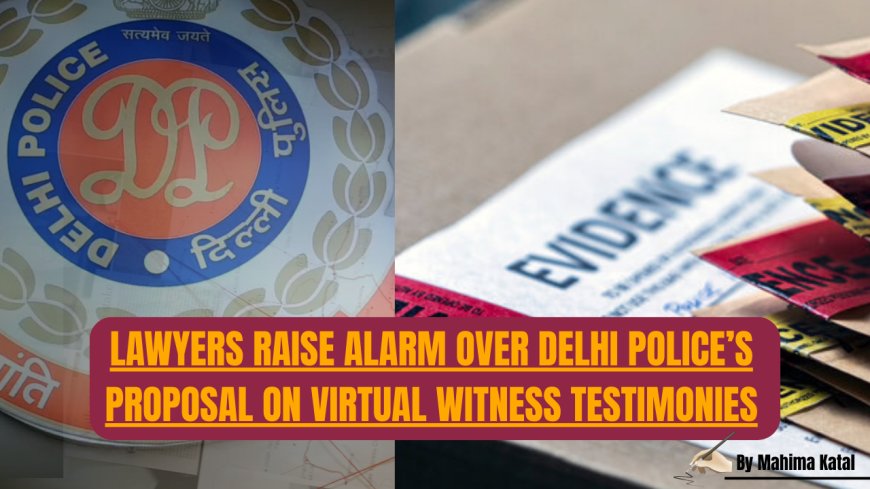Lawyers Raise Alarm Over Delhi Police’s Proposal on Virtual Witness Testimonies
Delhi Police has proposed that formal witnesses depose via video conferencing under BNSS 2023, while material witnesses appear physically. Lawyers and bar associations object, warning it undermines cross-examination and fair trial rights. Indefinite strike begins Sept 8.

New Delhi, September 4, 2025 – Days after lawyers in Delhi staged protests against the Lieutenant Governor’s August 13 notification for setting up video conferencing facilities in all Delhi police stations, the Delhi Police has written to the courts proposing that formal police witnesses may depose virtually while material witnesses should continue to testify in person.
In a letter dated September 4, Special Commissioner of of Delhi Police (Crime) Devesh Chandra Srivastava said the move would ensure a “smooth and balanced” implementation of the Bharatiya Nagarik Suraksha Sanhita (BNSS), 2023, which permits evidence to be recorded through electronic means as well.
Ambiguity Over Witness Categories
However, the proposal has raised eyebrows in the legal fraternity. Lawyers point out that the police have not specified which witnesses qualify as ‘formal’ and which as ‘material’, a classification that is ordinarily made by the court depending on the circumstances of a case.
“Every witness is important to the chain of evidence. Labelling some as formal and pushing them into video depositions risks undermining the cross-examination process,” said an advocate practicing at the Delhi High Court.
Concerns Over Fair Trial
At the heart of the opposition is the concern that virtual testimonies may dilute the sanctity of cross-examination, a fundamental safeguard in criminal trials. Lawyers argue that even so-called formal witnesses, such as those who prepare seizure memos or register FIRs, may still face crucial questions from the defense.
They also stress that it should be for the prosecution, subject to the court’s discretion, to decide on a case-to-case basis whether a police witness testifies physically or through video conferencing. By the present proposal, the prosecution has shifted the burden upon the defence counsel to make a request to conduct the examination of a police witness through Physical mode. Meaning thereby, the said request will have to be made through an application which will further require adjudication by the Court and the said process will cause further delay of the trial.
The Legal Framework
The BNSS 2023 has opened the door for wide use of technology in criminal proceedings. Section 530 allows for trials and appellate proceedings to be held electronically, while Sections 265 and 266 enable recording of prosecution and defense witnesses through audio-video means at designated places notified by the state government.
In July, the Delhi High Court issued rules identifying prisons, forensic labs, police stations, and prosecution offices as such designated locations. The Lieutenant Governor’s subsequent notification on August 13 operationalised video conferencing in all police stations – sparking protests from bar associations who fear it could tilt trials in favor of the police.
The Road Ahead
The Delhi Police’s latest communication signals an attempt to soften the implementation, but lawyers insist the proposal still leaves critical questions unanswered. As one advocate put it: “Fair trial rights cannot be compromised for administrative convenience. Virtual recording of evidence of the police witness hearings must remain the exception, not the norm.”
The matter now rests with the courts, which will decide how to balance the efficiency of technology with the integrity of criminal trials.
However, the coordination committee of the Delhi District Courts have called indefinite strike against the proposal and notification w.e.f. 8th of September, 2025.
Verdicto will continue to follow this story closely, bringing you legal insights, expert interviews, and fact-based analysis.
Stay tuned. Because where law meets journalism — truth must prevail.
📌 Follow us on YouTube, Instagram, and Twitter for more updates.







